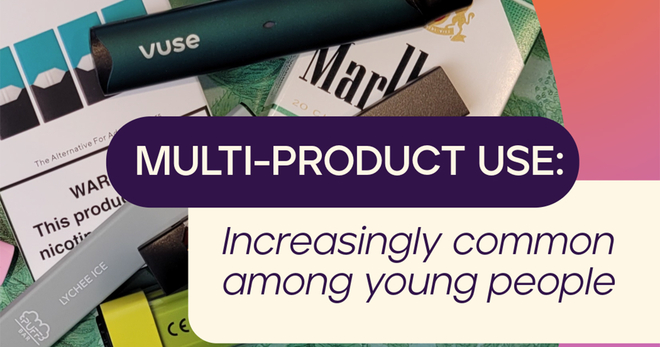Discipline Is Not the Answer: Better Approaches to On-campus Student Tobacco Use
Youth nicotine use, driven by flavored e-cigarettes that are easily accessible to young people, remains high in the United States. In 2024, 1.63 million middle and high schoolers reported current e-cigarette use, with nearly 40% of young e-cigarette users reporting frequent use and 26% reporting daily use. The consequences of use are real: nicotine can harm the developing adolescent brain and make young people more susceptible to addiction later in life, and nicotine addiction can increase stress and intensify symptoms of depression and anxiety. These risks are of particular concern in the context of the youth mental health crisis: the results of the Centers for Disease Control and Prevention’s latest Youth Risk Behavior Survey show that despite small, recent improvements, high schoolers’ mental health has worsened over the past decade.
Schools play a central role in confronting and addressing youth tobacco and nicotine use. Teachers surveyed by Truth Initiative have expressed concern about students’ nicotine use, particularly vaping, saying it results in frequent class interruptions and impacts student’s ability to focus. As the nicotine product landscape continues to evolve, it is crucial that school personnel are equipped to help prevent and intervene on youth tobacco and nicotine use at school.
To address these concerns, Truth Initiative developed Vaping: Know the truth, a national youth vaping prevention curriculum for middle and high school students that has reached 1.5 million students with the facts about nicotine addiction and resources to quit. This online program was developed as a positive, modern approach to guide teachers and educate youth through these products and their risks. It is intended to be used in the classroom for all students – it is not intended as a remedial program or a punishment for those caught vaping or using other tobacco or nicotine products on school grounds.
With many schools modernizing their tobacco- and nicotine-free policies, this document answers questions about how schools should handle policy violations and provides suggestions for how best to address student tobacco and nicotine use at school.
Responding to violations of tobacco- and nicotine-free school policies
Nearly all (99%) smokers start using tobacco before age 26 - partly due to the tobacco industry’s history of targeting young people with products that are appealing and accessible. Because nicotine is addictive and can impact the developing brain, and because a well-funded industry pushes their products into young people’s hands, it is important that schools take a supportive approach to discipline for tobacco and nicotine violations. Truth Initiative does not support suspensions or expulsions as a punishment for tobacco or nicotine use, including vaping and oral nicotine pouch use, on school grounds.
We know that suspension can cause even more problems at school, leading to lower test scores and graduation rates, among other poor outcomes. We note with concern that there are serious differences in how suspensions and expulsions are used, with Black, Latino, and other minority students more likely to be suspended or expelled. We believe that the best way to address school tobacco and nicotine violations is to help students quit using these products.
Truth Initiative recommends that students who violate tobacco- and nicotine-free policies be approached with support, focusing on helping them understand the risks of nicotine addiction and eventually quit.
We encourage schools to refer students to quitting services that can help them succeed. EX Program, a free digital quitting program developed by Truth Initiative with Mayo Clinic, is the go-to guide to help people of all ages quit any type of tobacco or nicotine product with personalized quit plans, daily reminders, and the most established online quitting community. A study found that teens enrolled in EX Program’s text message program were 35% more likely to quit nicotine, and found that the program was effective for teens with high levels of nicotine dependence and mental health concerns. Additional resources are listed below.
Violations at the college level
While expulsion or suspension as a disciplinary tactic at the college level is less common, we do not encourage this approach at the college level. Other options include working to change the social norms at the college, including by educating the campus about the harms of nicotine addiction and sharing resources to quit. Truth Initiative’s Tobacco/Nicotine-Free College Program provides more information about preventing nicotine addiction on college campuses and helping campus community members quit.
Additional resources
Cessation and prevention resources that may be useful for schools and parents include:
American Heart Association’s Tobacco-Free Schools Toolkit
American Academy of Pediatrics Behavioral Cessation Supports for Youth and Young Adults
The American College of Preventive Medicine Tobacco Cessation Resources for Youth – Tools and resources for parents, teachers and counselors on tobacco and nicotine cessation
More in emerging tobacco products
Want support quitting? Join EX Program
By clicking JOIN, you agree to the Terms, Text Message Terms and Privacy Policy.
Msg&Data rates may apply; msgs are automated.


